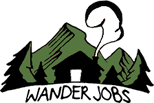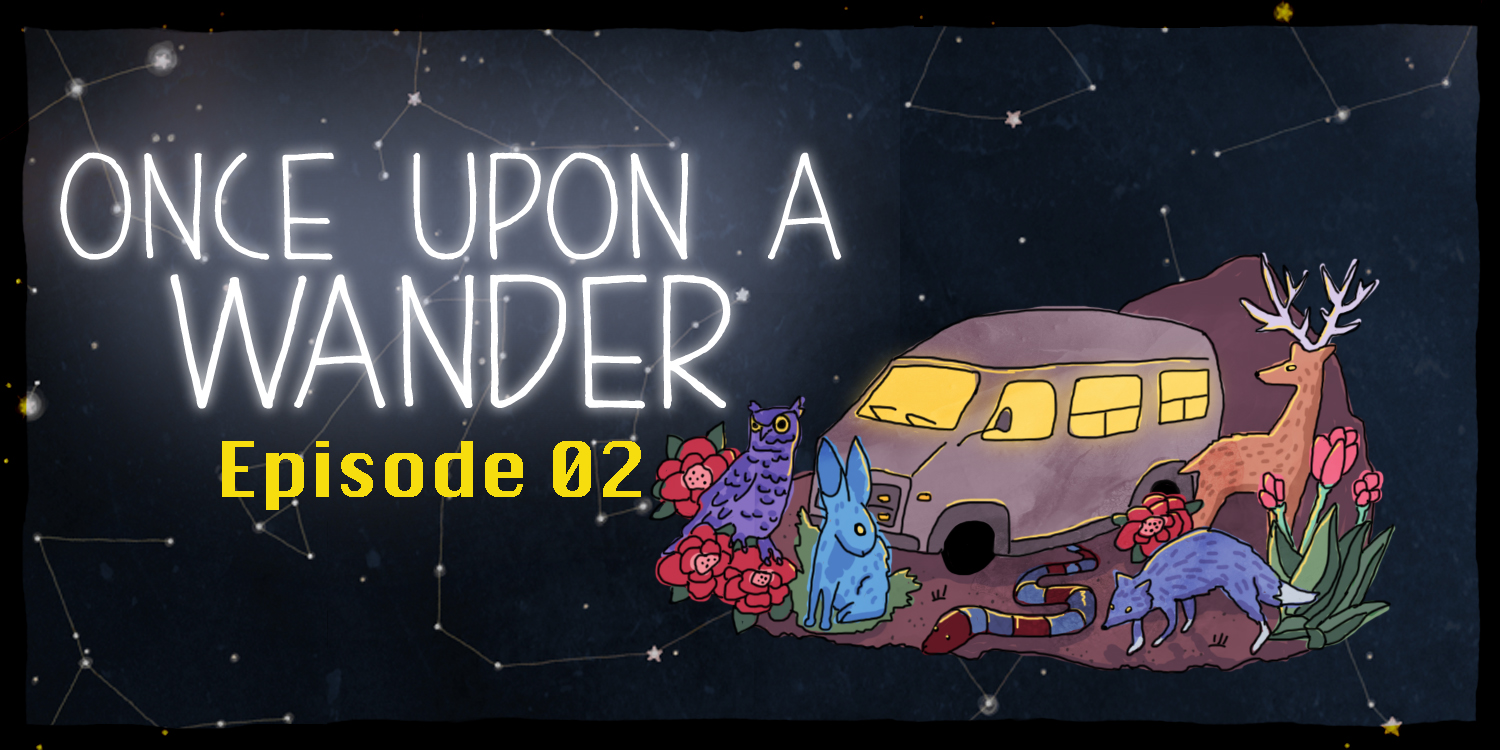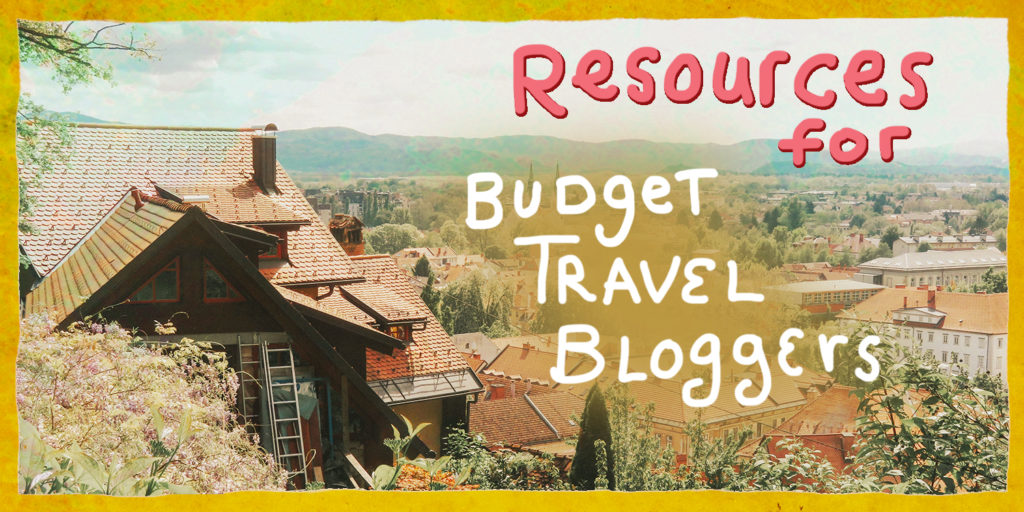This is a transcript of Episode 1 of the Once Upon A Wander podcast.
Feeling pressure to marry from her Mormon family, Nita instead chooses to venture out and finds a new life among seasonal travelers in Grand Teton National Park.
Jacqueline: Welcome to Once Upon a Wander, Nita.
Nita: Thanks.
J: So I met Nita in 2015 when we worked together at Signal Mountain Lodge in Grand Teton National Park. And then, we were both pretty young. We were housekeepers. Nita I think you were still a teenager and I was a little bit older than you, maybe 23 or something at the time. And it was one of your first travel experiences in the seasonal world, is that right?
N: It was my first seasonal job.
J: The first.
N: Yeah.
J: And I think it was around three or four for me. And I liked you right away, I remember you were one of my first friends there and we bonded over some nerdy movie discussion or something great like that.
So, Nita was adopted into a Mormon family so going into a traveling lifestyle was a pretty big, bold move for her to make. So I think we’re gonna start with that part of the discussion, that angle, and then go from there and see if you have anything else you’d like to input.
N: Okay.
J: So, yeah if that’s cool with you, maybe could you describe the life that your family had laid out for you, and what that looked like.
N: Pretty generally, females in the church are highly encouraged to, sure, go to school, but the expectation is that once you’re in school, you’re gonna meet a husband and you’re gonna start a family. And that’s gonna be your life, is the husband and kids.
So I had the one, like, rebellious phase where I was like you know what, I did a year of school, I’m gonna go work… not in my hometown. Like you said, it was a bold move.
J: So that kinda answers the next question a bit, but how was the life you saw for yourself different? What made you want to travel like that?
N: The real reason I started wanting to travel is not being at home. Which is a great motivator. So starting a seasonal job was a great way for an eighteen year old, Nineteen year old, to get out of the house and see something new. And once I got out here, I realized that there was so much more to explore and see and people to meet. I couldn’t go back.
J: Yeah. And I just wanna throw it out there for people not familiar with the type of seasonal jobs we’re talking about, these are usually in touristy type places where people pay a lot of money to go visit. And they need a lot of seasonal staff to actually go live on property. So the seasonal jobs we’re talking about come with staff housing. So we’re living in a community with a bunch of other people who are also traveling for the season and have different lifestyles.
So yeah, Signal Mountain Lodge in Grand Teton National Park is open basically for summer and fall and it closes every winter. So every year, you still have to travel in the off-season or find somewhere to go between summers.
Signal Mountain is a really beautiful place, community-wise. I know I kinda felt at home there and I think it’s become you’re home?
N: Mhm.
J: And after being away so many months in the winter, what is the feeling you get when you’re going back to this place in a community of travelers and seeing the Grand Teton mountains and being on that lake and seeing the forest? What does that actually feel like?
N: It’s… I mean it’s real hard to describe because you say the word home and everyone has a different image and feeling of home. But right around, I’ll say February, I start getting an itch. There’s all these friends I wanna see, all these hikes I start thinking about. Just the view of walking down to breakfast every morning.
And then right around that time, Kelsey will start contacting people and the itch gets stronger.
And then I roll into Jackson Hole in May, late April. And it’s… it’s like a cross between a settling, like ahhh I’m home, and the thrill of adventure of like, I’m here, I’ve got mountains to summit, people to see. Let’s get going on this.
J: That’s awesome. If you’re comfortable talking about it, what was your family’s reaction to you wanting to do this lifestyle and continuing with it year after year and basically saying no to their plan for you?
N: If I had stayed a member of the church, I think they would have not really fully accepted this lifestyle, but they would have more or less been okay with it. The real kicker is what happens when you travel is you start learning. And the more you learn, the more trouble you get into. As I’m sure everyone knows.
(laughs)
J: You naughty thinker!
N: I know! So I came out here in 2015 super sheltered. This was the first non-Mormon community that I’d been a part of. And being the only Mormon in, say, 50 miles, is a bit of a shock for someone who has lived their entire life surrounded, like every single one of my friends in high school was a Mormon.
Growing up you hear the Mormons are the righteous members of the world and everyone else is a sinner and it is our responsibility to ensure that the sinners have an opportunity for redemption.
And I came out here in 2015 and met a whole bunch of people, and none of them seemed to need saving. They were all doing alright.
(laughs)
I mean granted, there were a few people who, uh…
J: Could use some help?
N: Could use some help, but more in the like, therapy department, not in the come-to-Jesus way. And I realized that all the monsters under the bed and in the closet that I had been told were real and out to get me did not exist.
I wanted to travel more. And see more. And test that more. And the more I traveled… I did a year where I worked at home but I would travel overseas. The more I traveled, the more I met people who were just fine and were in fact some of the nicest people that I ever met. And they were nowhere near coming to Jesus. And it kind of opened my eyes to the kind of lifestyle that was being laid out for me, and what I would be forced to do and settle with if I had stayed Mormon. And I just couldn’t anymore. So I left the church and that was the big… the big deal in my family. So the double whammy of leaving the church and becoming the seasonal worker strained family relations, I’ll say.
J: Your attitude about it has been pretty incredible. I don’t know that I know anyone else who would handle it quite so well as you have. And even before all that happened, the first year I met you I remember how you had a really good sense of humor about it and we used to accuse you of blasphemy for eating certain things and would try to get you to have some soda.
N: Oh yeah.
J: You were a good sport.
N: Yeah even back in 2015 I was starting to feel my rebellious streak.
J: One of the biggest draws of the types of seasonal jobs we do is living within that community of travelers and peers that are like you. So what’s it like to live with the people you’re working with in kind of an extended family? You have to share rooms with them, eat meals with them, explore nature with them. It’s very different from the lifestyle most people have of living in one place with their family and going to work and then not having to be around those people or having different people.
And this particular one is like forty minutes from town, so the people you work with and live with are your people.
N: Yeah. An extended family is a good way to put it. You know, we’re all… we all live together, eat together, sleep together, work together, hike together, camp together, shop together…
J: And all kinds of sleep together, too.
N: All kinds of sleep together. Very many Signal Mountain babies. It’s an extended family.
You’ve got that weird Uncle Tim who drinks a little too much and weird things, but he’s alright in the end.
(laughs)
And there’s those cousins you really don’t like and try to avoid as much as possible, but you’re polite when you see them in public. And then there’s the family members that you really, really like and you hang out with them all the time.
Those people really have become my second family. I guess now my first family. Especially this year, in a time when you gotta pull together without being too close to each other.
J: Right, you’re there right now during social distancing era. How’s that?
N: It’s strange. The employee dining room is spaced ten feet apart and you can’t sit with anyone. The quad isn’t really a thing. There’s sixty of us here this year instead of the hundred and fifty. Lots of porch parties, I’ll say.
J: Hm. Yeah it’s gotta be a lot different.
N: Yeah. The family dynamic up here has really gotten tighter. Even the few new people that we have here, it’s very much a- you know what, we’re in this together. If you particularly care more about social distancing then everyone else, that’s absolutely fine. We’ll invite you to things but we understand that you don’t necessarily want to. Or we’ll try and hang out six feet apart or whatever or go down to the beach.
It’s much more of a tight-knit family. There’s no one this year that I can think of that is someone that I wouldn’t choose to hang out with. Everyone who shows up to a porch party, it’s like, oh, hey! There’s that person! Or, oh hey! It’s good to see you.
I may not message them and say hey, let’s go hang out, but we’re all friends here this year. Which is strange, even for a seasonal community.
J: Yeah, that sounds really cool. There’s always a couple of people who don’t quite fit in, but that sounds like a really good dynamic.
And I guess the last thing I wanna talk about is the nature, because you can’t really talk about Signal Mountain without mentioning that it’s in Grand Teton National Park. You have to pass through the gate in order to be there. So you’re living right on Jackson Lake.
It’s probably… it’d definitely the most stunning view I’ve ever seen. And walking by those mountains, it’s like a five minute walk to work past the lake, past the mountains. There’s beautiful cabins, there’s hiking trails right on property, it’s all forested, you can go pick berries or mushrooms or go swimming in the lake and all these things. There’s boating on the lake.
So do you have any special memory of being in nature or one thing that you just really like? Even if it’s a small that stands out to you. Or a big thing. There’s just so much there.
N: You’re right, there’s just so much. I mean it’s a summer camp for adults.
(laughs)
J: Yes.
N: That’s a real tough one.
J: Yeah, it is. Let me think with you.
(laughs)
J: We jumped off of Phelps rock that one time, that was one of my favorite memories. Yeah there’s this thirty-foot rock, about, that’s in one of the nearby hikes. So it helps to have friends with cars, which is pretty easy because so many people there have cars. And even acquaintances are willing to drive you. There’s always someone to take you on a hike.
It was our friend Carlos’ last day, or nearing his last day, and we drove out to one of these hikes to Phelps rock and jumped off. And that’s always on the bucket list of people who go there.
N: Mhm. Oh there was that time that we romped through the campground looking for mushrooms.
J: Mhm. I still remember that. I still go out to find- try and find- morels in most of the places I go, and I haven’t found any except for in the Grand Tetons. And I remember we came upon a patch, it was really exciting. Those were good.
And then one of our chef friends cooked them up in the kitchen and served them to us on a little pizza he whipped together. That was fun. Never did find any huckleberries though.
N: I found a huckleberry patch actually yesterday while we were out hiking. Which is, that’s one of my favorite things about this park. You’re just out hiking and just here for the awesome views and sunshine, and then you turn a corner and it’s just this field of berry bushes.
It was just the entire hillside of huckleberry bushes. You know, I get particularly excited about plants, and edible plants in particular. And I definitely had a few as we made our way past the bushes. Didn’t pick very many because- inside the park and all that jazz. But I definitely had a snack up there.
I think overall, especially… I guess to frame it in the sense of religion and travel that we’ve kind of established here:
Overall, I feel more of a sense of spirituality in these mountains when I’m sweating buckets and frustrated and bushwhacking through trees and getting all scarped up and sunburned. I feel more spiritual, more connected, more whole than I ever felt in any church building, in any cathedral, in any quote unquote holy site that I’d ever traveled to or visited.
These mountains are my church. And my worship services are my hikes. And taking care of it is hugely important to me. And it’s very hard to explain that to someone in a very casual conversation.
This area is both my home and my spiritual home.
J: That’s really awesome. I like that a lot. Is there anything else you want to leave us with?
N: Only that whoever’s listening should try it once. Just once. Come out here for the summer or find your local national park. I’m sure there’s some company out there needing a housekeeper or someone to work in the gift shop. Just come out here and try it. It changed my life, it changes everyone else’s life who comes out here. You become a better person for it. I most definitely did.
J: Thank you very much, Nita. That was a really fun talk.
Browse every episode of Once Upon a Wander here or on Apple podcasts.


